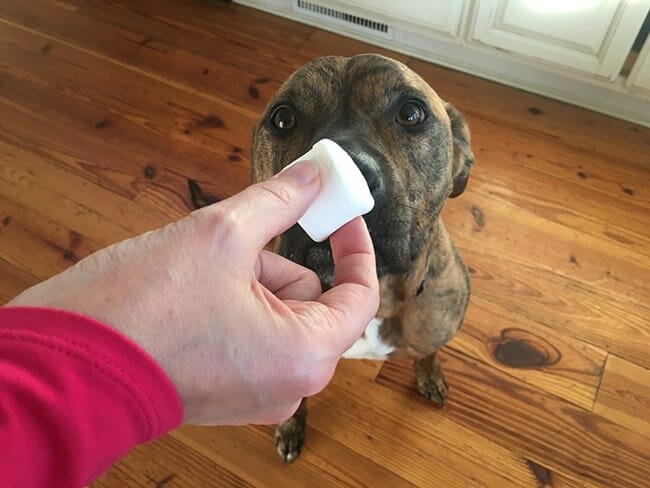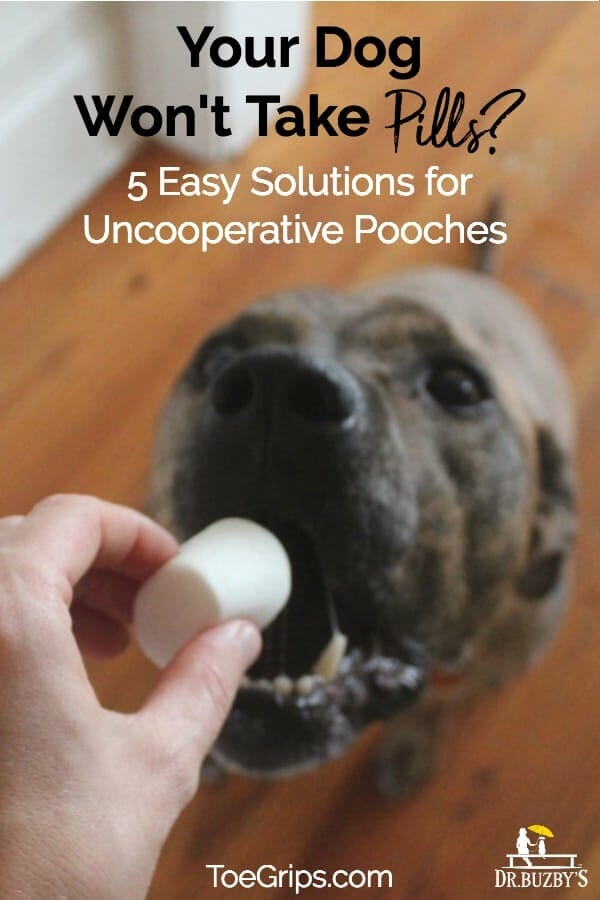When your dog won’t eat but needs to take medicine, try hiding the medicine in a special treat or hand-feeding it with food. Your veterinarian may also prescribe appetite-stimulating medications if needed.
It is important to use only medications prescribed by your vet. Additionally, you can try various strategies to entice your dog to eat, such as cutting back on treats, feeding on a regular schedule, making mealtime fun, and taking your dog for a walk before meals.
Remember, if your dog hasn’t eaten in two days, it is advisable to consult a veterinarian. Refusing to eat dinner but eating treats may indicate a learned behavior.

Credit: toegrips.com
Understanding The Issue
If your dog won’t eat but needs to take medicine, you can try hiding the medication in a special treat or food that your dog enjoys. Hand feeding the medicated pieces of food or treat can also help ensure that your dog swallows the pill.
Additionally, your veterinarian may prescribe appetite-stimulating medications if needed.
Reasons Why A Dog Won’t Eat
There are several reasons why your dog may be refusing to eat. Understanding these reasons can help you identify the root cause of the issue and find solutions:1. Illness or pain: Dogs often lose their appetite when they’re not feeling well or in pain. It could be a minor ailment like an upset stomach or something more serious that requires veterinary attention.2. Medication side effects: Some medications can cause loss of appetite as a side effect. If your dog is currently on medication, it’s important to check if this could be the cause of their decreased appetite.3. Stress or anxiety: Just like humans, dogs can experience stress or anxiety that affects their appetite. Changes in their environment, routine, or the presence of new pets or people can trigger stress and lead to a decreased appetite.4. Dental problems: Dental issues, such as broken teeth or gum infections, can make eating painful for dogs. If your dog avoids eating hard food or shows signs of discomfort while eating, it’s important to check their teeth and gums.5. Age-related changes: Older dogs often experience a natural decline in their appetite due to changes in metabolism and reduced sense of smell. However, if your dog suddenly stops eating, it’s important to rule out any underlying health issues.Potential Health Concerns
When a dog refuses to eat, it’s essential to be aware of potential health concerns that could be causing this behavior. Here are some common health issues to consider:1. Gastrointestinal problems: Dogs with gastrointestinal issues such as gastritis, diarrhea, or constipation may lose their appetite. These conditions can be caused by various factors, including dietary indiscretion, infections, parasites, or underlying medical conditions. 2. Dental disease: Periodontal disease, tooth decay, or oral infections can cause pain and discomfort, leading to a loss of appetite in dogs. Regular dental care and check-ups are crucial for maintaining your dog’s oral health.3. Liver or kidney disease: Dogs with liver or kidney problems may experience a decreased appetite as a symptom. These conditions can be serious and require immediate veterinary attention.4. Infections or illness: If your dog has an infection or an underlying illness, they may lose their appetite. Common infections in dogs include respiratory infections, urinary tract infections, and tick-borne diseases.5. Cancer: In some cases, a decreased appetite can be a sign of cancer in dogs. If your dog’s loss of appetite is accompanied by other unusual symptoms, it’s important to consult a veterinarian.Remember, if your dog’s loss of appetite persists for more than a day or is accompanied by other concerning symptoms, it’s crucial to consult a veterinarian for a proper diagnosis and treatment plan.Solutions For Medicating
When your dog won’t eat but needs to take medicine, try hiding the medication in a special treat like canned dog food or a soft dog treat. Hand-feed your dog to ensure they swallow the pill. If needed, consult your veterinarian for appetite-stimulating medications.
Hiding Medication In Treats
If your dog refuses to take their medicine, disguising it in a tasty treat might do the trick. You can try hiding the medication in a small amount of canned dog food, cooked sweet potato, or a soft dog treat that can be molded around it. These treats, often referred to as Pill Pockets™, provide a convenient way to hide pills from your discerning pup. To ensure that your dog swallows the pill, always hand-feed the medicated treat or piece of food.
Using Prescribed Appetite Stimulants
If your dog’s lack of appetite persists, your veterinarian may prescribe medications to stimulate their appetite. These medications can help increase your dog’s interest in food and encourage them to eat. Commonly prescribed appetite stimulants include mirtazapine and capromorelin (Entyce®). It is crucial to use only medications prescribed by your veterinarian, as they will determine the appropriate dosage for your dog’s specific needs.
Hand-feeding Medicated Food
In some cases, hand-feeding medicated food may be necessary to ensure your dog takes their medicine. This method involves offering your dog small amounts of specially prepared food that has been infused or mixed with the prescribed medication. To hand-feed, place the food in your hand and offer it to your dog bit by bit, making sure they consume each portion thoroughly. Hand-feeding ensures that your dog receives the necessary medication while also addressing their lack of appetite.
By utilizing these solutions for medicating, you can overcome the challenge of administering medicine to a dog who refuses to eat. Remember to consult with your veterinarian to determine the best course of action and ensure the safety and well-being of your furry friend.
Encouraging Appetite
If your dog won’t eat but needs to take medicine, try hiding the medication in a small amount of canned dog food, cooked sweet potato, or a soft dog treat. Hand feed the treat to ensure your dog swallows the pill.
You can also consult your veterinarian for appetite-stimulating medications if needed.
Creating A Regular Feeding Schedule
To encourage your dog to eat when they need to take medication, it’s crucial to establish a regular feeding schedule. Dogs thrive on routine, so having consistent mealtime can help stimulate their appetite. Divide their daily food portions into two or three smaller meals throughout the day and feed them at the same time each day. This routine will help your dog anticipate mealtime and be more receptive to eating.Making Mealtime Enjoyable
Another way to encourage your dog to eat while taking medication is to make mealtime enjoyable. Use interactive toys or puzzle feeders that dispense food as your dog plays with them. This engages their senses and adds excitement to mealtime. Consider feeding your dog in a different location or even outside to make eating a fun experience. By associating positive emotions with food, your dog is more likely to have an increased appetite.Incorporating Enticing Food Options
When your dog isn’t eating, you may need to think outside the box and give them enticing food options. You can try mixing their regular kibble or wet food with something more appetizing, such as a small amount of canned dog food or meat broth. Another option is to incorporate highly palatable food toppers, like shredded chicken or baby food, to make their meals more appealing. Just make sure that any additional food options are safe and approved by your veterinarian.Hydrating To Support Appetite
Proper hydration is essential in supporting your dog’s appetite. If your dog is not drinking enough water, they may not feel hungry or show interest in food. Ensure that clean, fresh water is always available for your dog. Consider using a water fountain to make drinking more enticing, especially if your dog enjoys running water. Additionally, you can try adding a small amount of low-sodium chicken or beef broth to their water bowl to make it more appealing and encourage hydration. In conclusion, to encourage your dog to eat while needing to take medication, create a regular feeding schedule, make mealtime enjoyable, incorporate enticing food options, and ensure your dog stays hydrated. These strategies can help stimulate your dog’s appetite and ensure they get the medicine they need to recover.
Credit: www.akc.org

Credit: tractive.com
Frequently Asked Questions On My Dog Won’t Eat But Needs To Take Medicine
How Do You Give A Dog Medicine With No Appetite?
To give a dog medicine with no appetite, hide it in a special treat like canned dog food or a soft dog treat. Hand feed the treat to ensure they swallow it. Your veterinarian may prescribe appetite-stimulating medications if necessary.
What Medicine Can I Give My Dog If He Don’t Want To Eat?
Your veterinarian may prescribe medications to stimulate your dog’s appetite, such as mirtazapine and capromorelin. They may also prescribe antinausea medications like maropitant. It’s important to use only medications prescribed by your vet. If your dog refuses to eat, try hiding the medication in a special treat or hand-feeding it with food your dog enjoys.
How Long Can Sick Dog Go Without Eating?
A sick dog can usually go three to five days without eating, but it is not ideal. If your dog hasn’t eaten in two days, it is recommended to call a veterinarian. It is important to ensure your dog stays hydrated during this time.
What Can You Do When Your Dog Refuses To Eat?
When your dog refuses to eat, try hiding their medicine in a treat or soft food. You can also ask your vet for appetite-stimulating medications if needed. Ensure you stick to a regular feeding schedule and make mealtime enjoyable for your dog.
Taking them for a walk before meals may also increase their appetite.
Conclusion
If your dog won’t eat but needs to take medicine, there are several strategies you can try. You can hide the pill in a special treat or hand-feed the medicated food. Your veterinarian may also prescribe appetite-stimulating medications if needed.
Remember to only use medications prescribed by your vet. If your dog refuses to eat, you can try cutting back on treats, feeding on a regular schedule, or making mealtime more enjoyable. Ultimately, it’s important to consult with your veterinarian for the best course of action.



